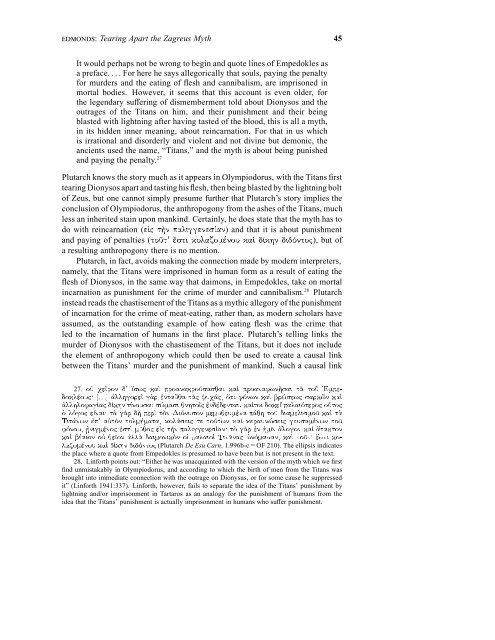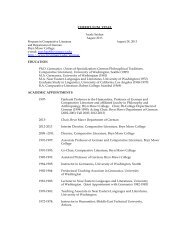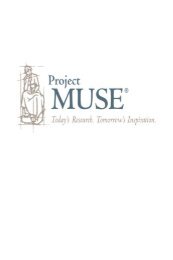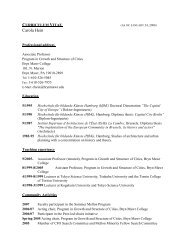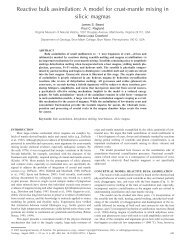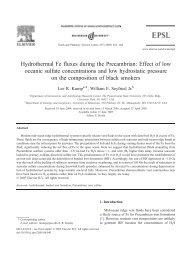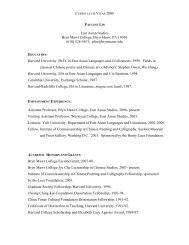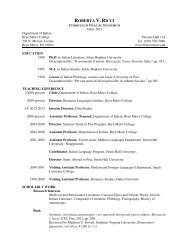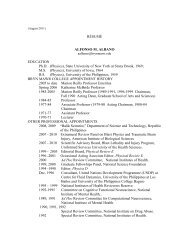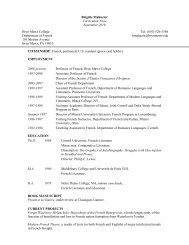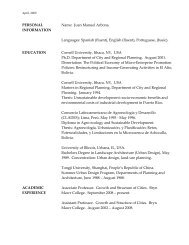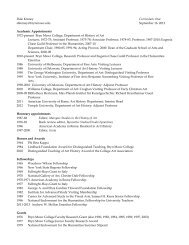Tearing Apart the Zagreus Myth - Bryn Mawr College
Tearing Apart the Zagreus Myth - Bryn Mawr College
Tearing Apart the Zagreus Myth - Bryn Mawr College
Create successful ePaper yourself
Turn your PDF publications into a flip-book with our unique Google optimized e-Paper software.
EDMONDS: <strong>Tearing</strong> <strong>Apart</strong> <strong>the</strong> <strong>Zagreus</strong> <strong>Myth</strong> 45<br />
It would perhaps not be wrong to begin and quote lines of Empedokles as<br />
a preface. . . . For here he says allegorically that souls, paying <strong>the</strong> penalty<br />
for murders and <strong>the</strong> eating of flesh and cannibalism, are imprisoned in<br />
mortal bodies. However, it seems that this account is even older, for<br />
<strong>the</strong> legendary suffering of dismemberment told about Dionysos and <strong>the</strong><br />
outrages of <strong>the</strong> Titans on him, and <strong>the</strong>ir punishment and <strong>the</strong>ir being<br />
blasted with lightning after having tasted of <strong>the</strong> blood, this is all a myth,<br />
in its hidden inner meaning, about reincarnation. For that in us which<br />
is irrational and disorderly and violent and not divine but demonic, <strong>the</strong><br />
ancients used <strong>the</strong> name, “Titans,” and <strong>the</strong> myth is about being punished<br />
and paying <strong>the</strong> penalty. 27<br />
Plutarch knows <strong>the</strong> story much as it appears in Olympiodorus, with <strong>the</strong> Titans first<br />
tearing Dionysos apart and tasting his flesh, <strong>the</strong>n being blasted by <strong>the</strong> lightning bolt<br />
of Zeus, but one cannot simply presume fur<strong>the</strong>r that Plutarch’s story implies <strong>the</strong><br />
conclusion of Olympiodorus, <strong>the</strong> anthropogony from <strong>the</strong> ashes of <strong>the</strong> Titans, much<br />
less an inherited stain upon mankind. Certainly, he does state that <strong>the</strong> myth has to<br />
do with reincarnation (eÊj t˜n paliggenesÐan) and that it is about punishment<br />
and paying of penalties (toÜt' êsti kolazomènou kaÈ dÐkhn didìntoj), but of<br />
a resulting anthropogony <strong>the</strong>re is no mention.<br />
Plutarch, in fact, avoids making <strong>the</strong> connection made by modern interpreters,<br />
namely, that <strong>the</strong> Titans were imprisoned in human form as a result of eating <strong>the</strong><br />
flesh of Dionysos, in <strong>the</strong> same way that daimons, in Empedokles, take on mortal<br />
incarnation as punishment for <strong>the</strong> crime of murder and cannibalism. 28 Plutarch<br />
instead reads <strong>the</strong> chastisement of <strong>the</strong> Titans as a mythic allegory of <strong>the</strong> punishment<br />
of incarnation for <strong>the</strong> crime of meat-eating, ra<strong>the</strong>r than, as modern scholars have<br />
assumed, as <strong>the</strong> outstanding example of how eating flesh was <strong>the</strong> crime that<br />
led to <strong>the</strong> incarnation of humans in <strong>the</strong> first place. Plutarch’s telling links <strong>the</strong><br />
murder of Dionysos with <strong>the</strong> chastisement of <strong>the</strong> Titans, but it does not include<br />
<strong>the</strong> element of anthropogony which could <strong>the</strong>n be used to create a causal link<br />
between <strong>the</strong> Titans’ murder and <strong>the</strong> punishment of mankind. Such a causal link<br />
27. oÎ xeØron d' Òswj kaÈ proanakroÔsasqai kaÈ proanafwn¨sai t€ toÜ ÇEmpedoklèouj;<br />
[...] ‚llhgoreØ g€r ântaÜqa t€j yuxˆj, íti fìnwn kaÈ br¸sewj sarkÀn kaÈ<br />
‚llhlofagÐaj dÐkhn tÐnousai s¸masi qnhtoØj ândèdentai. kaÐtoi dokeØ palaiìteroj oÝtoj<br />
å lìgoj eÚnai; t€ g€r d˜ perÈ tän Diìnuson memuqeumèna pˆqh toÜ diamelismoÜ kaÈ t€<br />
Titˆnwn âp' aÎtän tolm mata, kolˆseij te toÔtwn kaÈ keraun¸seij geusamènwn toÜ<br />
fìnou, šùnigmènoj âstÈ mÜqoj eÊj t˜n paliggenesÐan; tä g€r ân mØn Šlogon kaÈ Štakton<br />
kaÈ bÐaion oÎ qeØon ‚ll€ daimonikän oÉ palaioÈ Tit naj ²nìmasan, kaÈ toÜt' êsti kolazomènou<br />
kaÈ dÐkhn didìntoj (Plutarch De Esu Carn. 1.996b-c = OF 210). The ellipsis indicates<br />
<strong>the</strong> place where a quote from Empedokles is presumed to have been but is not present in <strong>the</strong> text.<br />
28. Linforth points out: “Ei<strong>the</strong>r he was unacquainted with <strong>the</strong> version of <strong>the</strong> myth which we first<br />
find unmistakably in Olympiodorus, and according to which <strong>the</strong> birth of men from <strong>the</strong> Titans was<br />
brought into immediate connection with <strong>the</strong> outrage on Dionysus, or for some cause he suppressed<br />
it” (Linforth 1941:337). Linforth, however, fails to separate <strong>the</strong> idea of <strong>the</strong> Titans’ punishment by<br />
lightning and/or imprisonment in Tartaros as an analogy for <strong>the</strong> punishment of humans from <strong>the</strong><br />
idea that <strong>the</strong> Titans’ punishment is actually imprisonment in humans who suffer punishment.


